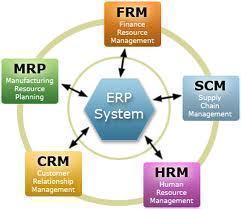ERP Systems
ERP (Enterprise Resource Planning) is a process in which business management is integrated with technology. ERP systems, therefore, allow this integration to be done effectively and without fault. An effective ERP system requires that many aspects of the business are connected. To have the best architecture for the organization, the following must be part of the ERP System:
- Manufacturing: Resource planning, engineering, material planning, bills of material, quality, etc.
- Financials: Accounts payable, accounts received, cash management, etc.
- Human Resource: Recruitment, benefits, payroll, labor rules, etc.
- Supply chain management: Inventory management, supply management, sales order, etc.

- Projects: Costing, billing, etc.
- Customer Relations: Sales and marketing, commissions, services, etc.
- Data Warehouse: All information the company uses, employees, and customers for their learning.
An ERP system can cost a corporation thousands of dollars to run and operate. However, there are many open source ERP systems that have the same features found in a paid package. Below is a list of the ERP system and the server language it is able to handle. Therefore, determine the language before searching for the right ERP package.
Open Source ERP Systems
| ERP Package | Language Base |
|---|---|
| Adempiere |
Java Ali |
| BlueERP |
PHP |
| Compiere |
Java |
| Dolibarr |
PHP |
| ERP5 |
Python |
| Fedena |
Ruby |
| GNU Enterprise |
PHP, Python |
| JFire |
Java |
| Kuali Foundation |
Java |
| LedgerSMB |
Perl |
| OFBiz |
Apache/Java |
| Openbravo |
Java |
| OpenERP |
Python, PostgreSQL |
| Opentaps |
Java |
| Postbooks |
C++, JavaScript, PostgreSQL |
| SQL-Ledger |
Perl, PostgreSQL |
| Tryton |
Python |
| WebERP |
PHP, MySQL |
The ERP system allows the communication and transfer of important data between departments to be done in a more smooth and orderly fashion. By integrating aspects of business and technology into one, ERP allows effective execution with all departments in connection.


Comments - No Responses to “ERP Systems”
Sorry but comments are closed at this time.